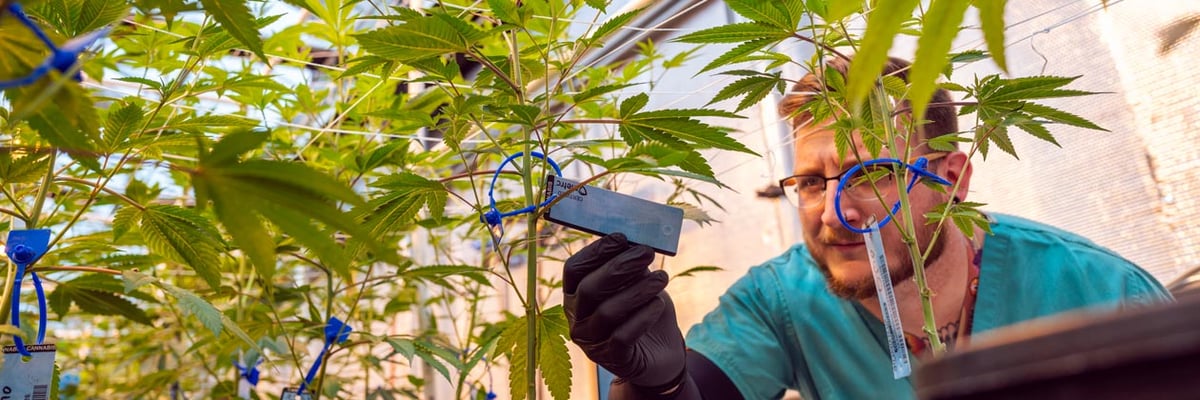Author: Ben Hartman | May 19, 2022 | 4 Min Read
People in Cannabis: How Can Technology and Efficiency Equalize Cannabis Compliance?

During his days as a beat cop patrolling Arvada, Colorado in 2001, the prospect of someday working for a legal cannabis company may have seemed like science fiction to Lewis Koski.
“Legalization was not something that was on anybody’s radar screen or part of the mainstream conversation and the populist [legalization] movement that we’ve come to know it to be today was pretty non-existent when I first got started in law enforcement,” Koski said.
But a lot can change in cannabis in a few years, much less in two decades.
Today, Koski is the Chief Strategy Officer for Metrc, a Florida-based company that provides track-and-trace services for cannabis regulators in more than 20 states. The company gives regulators a software-as-a-solution (SaaS) system configured to their needs and offers complete supply-chain visibility for the legal cannabis approved in their state.
 “Metrc’s primary purpose is as a reporting software system where regulators can see in real-time what's happening with each separate licensee’s inventory so they can monitor efficiently and protect public health and safety first and foremost but also provide a regulatory structure that allows for businesses to be successful in this space,” Koski said.
“Metrc’s primary purpose is as a reporting software system where regulators can see in real-time what's happening with each separate licensee’s inventory so they can monitor efficiently and protect public health and safety first and foremost but also provide a regulatory structure that allows for businesses to be successful in this space,” Koski said.
Key to Metrc’s operations is radio frequency identification (RFID) tags fitted with electronic chips and affixed to each cannabis plant. The tags are “regulation-compliant,” according to Metrc, and cannabis workers and regulators can use handheld devices to scan the chips and collect tag data, including status, tracking, location information, product origin, lot, serial number, and more.
Before joining Metrc in 2019, Lewis was the Deputy Senior Director of the Colorado Department of Revenue’s Enforcement Business Group, responsible for regulating cannabis and gaming, liquor and tobacco, horse racing, and the state’s auto industry. Koski also served as the Director of the Colorado Department of Revenue’s Marijuana Enforcement Division.
Koski said that in 2010 he jumped at the opportunity to help found the Marijuana Enforcement Division.
“We were expecting it to be a decade or more before [recreational cannabis] legalization would happen, but then it happened in two years.”
Koski said he and Metrc are “agnostic on cannabis legalization” but that he “is pretty passionate about the potential of the government to implement legalization policy well.”
Can technology even the playing field on cannabis compliance?
Koski said that by tracking every plant from seed to shelf, states can prevent the diversion of regulated cannabis to the illicit market and vice versa. He added that their data can also provide insights into industry trends and help businesses develop better practices. He said the system could also potentially help prevent public health risks such as the EVALI crisis, the 2019 wave of injuries - and 68 deaths - linked to unsafe vaping products.
According to Koski, the technology can also help even the playing field for smaller cannabis companies by providing them with the means to report information to regulators efficiently.
“Providing the tools that create efficiencies is what’s really, really important because a lot of times, everything sounds good in regulation, but when it comes to demonstrating compliance, that can be where some of the highest costs for those [cannabis] businesses exist.”
But while cannabis companies and state regulatory agencies are commonly-seen as having an adversarial nature to their relationship, Koski said his time at the Department of Revenue’s Enforcement Business Group taught him that this is by no means unique.
“When I left state government, I had oversight over casino gambling, liquor enforcement, the auto industry, horse racing, and then cannabis, and that natural tension exists in all of those regulatory frameworks.”
Following Colorado’s Example
Colorado voters legalized medical marijuana legalization in 2000. In 2012, Colorado joined Washington as the first two states to legalize recreational cannabis when voters overwhelmingly approved Amendment 64.
The state’s legal cannabis industry is seen as a trailblazer of sorts to many, and according to Koski, it provides some lessons for how other states can implement marijuana reform.
“We made some mistakes too. We didn’t perform flawlessly. But I think Colorado in a lot of ways maintained its status as a very well run jurisdiction in terms of hitting that balance between public health and safety needs and also the needs of the industry to have worthwhile and profitable business models.”
Koski did mention one clear shortcoming in Colorado.
“I think that there could have been more done on the social justice and equity front. And hindsight is certainly 20-20 on those things, but when I look back, I think more could have been done on that.”
According to Colorado's Marijuana Enforcement Division, nearly 17% of the state’s cannabis businesses were minority-owned as of January 1, 2022. Also, in January, Colorado officials announced that they had achieved their goal of reaching at least 16.8 percent minority ownership in the cannabis market by June 30, 2022.
And just as Colorado has served as a model for recent adopters of legalization, Koski said the state and others could also help inform policymakers if and when legalization on the federal level becomes a reality.
“We’re hoping that the federal government continues to learn and listen to a wide variety of stakeholders so that we can get it right, and I think what's most important is that whatever we decide to do from a federal standpoint is done well.”
Contributors

Ben Hartman
From HACCP certification to the basics of hygiene, our on-demand courseware has you covered.







